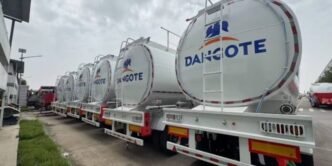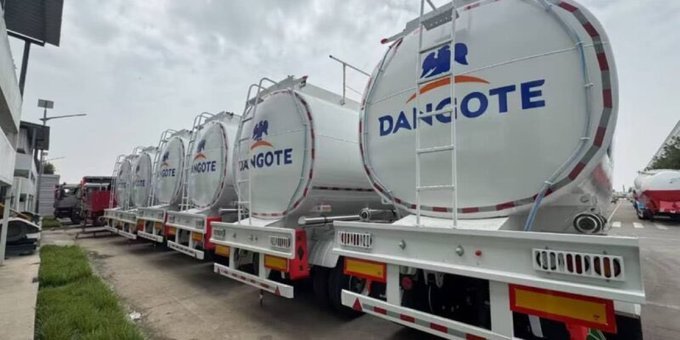Lagos, Nigeria – Aerospace giant Bombardier Inc. has thrown its weight behind the Dangote Petroleum Refinery, describing the $20 billion facility as a “world-class industrial hub” and praising its large-scale production of jet fuel as a transformational boost for the global aviation industry.
In what is being seen as a landmark endorsement, Bombardier highlighted the refinery’s capacity to meet rising demand for aviation fuel across Africa and beyond, calling it a “symbol of industrial excellence” with far-reaching implications for airline operations, cost efficiency, and connectivity.
Bombardier’s Endorsement: A Seal of Global Confidence
In a statement released over the weekend, Bombardier applauded the Dangote Refinery’s production capacity, noting that its ability to refine high-quality jet fuel will not only stabilize supply within Nigeria but also strengthen global aviation logistics.
“The Dangote Refinery stands as a world-class facility and a symbol of Africa’s industrial advancement. Its jet fuel production capacity will ensure a sustainable supply chain for airlines, foster greater regional connectivity, and contribute significantly to global aviation growth,” the aerospace firm stated.
For Bombardier, a company with a rich legacy in manufacturing business jets and aviation technology, the endorsement signals confidence in Nigeria’s industrial capacity and the growing role of African infrastructure in shaping global supply chains.
Nigeria’s Long-Standing Aviation Fuel Crisis
The endorsement comes at a critical time for Nigeria’s aviation sector, which has battled chronic shortages and spiraling costs of aviation fuel (Jet A1).
For years, local airlines have decried heavy reliance on imported jet fuel, which exposed them to volatile foreign exchange rates, global oil price shocks, and frequent supply disruptions. These challenges forced carriers to raise ticket prices, reduce flight schedules, or suspend operations altogether.
International airlines operating in Nigeria have also faced difficulties, often struggling to secure enough fuel at major airports in Lagos, Abuja, and Port Harcourt. Some carriers resorted to “tankering” – lifting extra fuel on inbound flights to avoid refueling challenges locally – a practice that added cost burdens and increased operational complexity.
With the Dangote Refinery now producing aviation fuel at scale, industry experts believe the tide could be turning.
How Dangote Refinery Changes the Equation
Commissioned in 2023 and touted as the world’s largest single-train refinery, the Dangote facility in Lagos has steadily ramped up output of petrol, diesel, and aviation fuel. Its entry into the jet fuel market is already being described as a “game-changer” for Nigeria’s troubled aviation sector.
By producing aviation fuel domestically, the refinery reduces dependence on imports and cuts costs tied to currency fluctuations. It also promises a steady supply for Nigerian airlines, which could translate to more affordable tickets for travelers and improved reliability in flight schedules.
Furthermore, the refinery’s sheer size and production capacity mean it is well-positioned to export surplus jet fuel to international markets, positioning Nigeria as a major aviation fuel hub in West Africa.
Aviation analyst, Dr. Hassan Bello, told reporters: “What Dangote Refinery offers is not just local stability but regional transformation. It can supply airlines across Africa, strengthen hubs like Lagos, and reduce the reliance on European or Middle Eastern refineries.”
Economic Implications: Jobs, Investment, and Trade
The economic ripple effects of the refinery extend beyond the aviation sector. With Bombardier’s endorsement, Nigeria gains a powerful validation of its industrial capabilities, potentially boosting investor confidence across multiple sectors.
Key implications include:
- Job Creation: Thousands of direct and indirect jobs in aviation, logistics, and energy services.
- Reduced Import Bill: Saving billions of dollars annually by cutting petroleum product imports.
- Stronger Naira Stability: Less pressure on foreign exchange markets as airlines and other industries buy fuel locally.
- Export Potential: Strengthening Nigeria’s trade balance as jet fuel and other refined products are sold to global buyers.
For the Nigerian economy, long plagued by over-reliance on crude oil exports and refined product imports, the refinery offers a rare opportunity to shift the balance toward self-sufficiency.
Bombardier’s Stake in the Endorsement
While Bombardier does not directly operate in fuel production, its interest lies in ensuring that aviation ecosystems worldwide remain stable and sustainable. Reliable and affordable jet fuel supply translates to stronger demand for aircraft, business jets, and aviation services.
By endorsing the Dangote Refinery, Bombardier aligns itself with a facility that could secure supply chains for airlines in Africa, one of the fastest-growing aviation markets in the world.
The International Air Transport Association (IATA) projects that Africa’s passenger numbers will double in the next 20 years, making reliable fuel availability critical for supporting growth.
Global Industry Impact
The endorsement also underscores a broader trend: global recognition of Africa’s growing role in aviation and energy supply chains.
With international travel demand rebounding after the COVID-19 pandemic, jet fuel demand is climbing sharply. Traditional supply hubs in Europe and the Middle East are under pressure, creating opportunities for new suppliers like Nigeria.
If Nigeria consolidates its role as a stable exporter of aviation fuel, it could become a key partner not just for African airlines but also for global carriers making transcontinental flights through West Africa.
Industry consultant Sarah Okon observed: “With Bombardier’s endorsement, the message is clear – the world is watching Nigeria. If managed properly, Dangote Refinery can make Lagos and Abuja global refueling hubs, comparable to Johannesburg or Dubai.”
Regional and Strategic Implications
The refinery’s jet fuel production also strengthens the Multinational Joint Task Force (MNJTF) and other regional security operations, which depend on reliable aviation fuel for surveillance aircraft and logistics. Stable local supply means reduced costs for governments engaged in counter-insurgency operations in the Lake Chad Basin.
At the same time, Nigeria’s neighbors such as Ghana, Cameroon, and Ivory Coast could benefit from cheaper imports of jet fuel, boosting regional cooperation and trade integration.
Challenges Ahead
Despite the optimism, challenges remain. Industry observers caution that logistics, pricing policies, and distribution efficiency will determine whether the refinery’s benefits are fully realized.
- Infrastructure Bottlenecks: Nigeria’s distribution pipelines and storage facilities require upgrades to ensure smooth delivery of aviation fuel nationwide.
- Policy Frameworks: Clear policies are needed to regulate pricing and prevent artificial inflation by middlemen.
- Security Risks: Given the refinery’s strategic importance, safeguarding it from potential sabotage or unrest is critical.
Without addressing these issues, the full benefits of Bombardier’s endorsement and the refinery’s potential could be undermined.
The Road Ahead
The Dangote Refinery has already been hailed as Africa’s most ambitious industrial project, and Bombardier’s endorsement adds global credibility to its achievements. For Nigeria, it is both a vote of confidence and a challenge to deliver on the promise of industrial transformation.
As airlines look forward to more reliable fuel supplies and travelers anticipate reduced costs, the aviation sector may soon enter a new era. With demand for air travel expected to surge across Africa in the coming decades, Nigeria has an opportunity to position itself at the center of the continent’s aviation future.
For now, one thing is clear: the Dangote Refinery is no longer just a Nigerian success story. With Bombardier’s endorsement, it is now firmly on the global aviation map.














